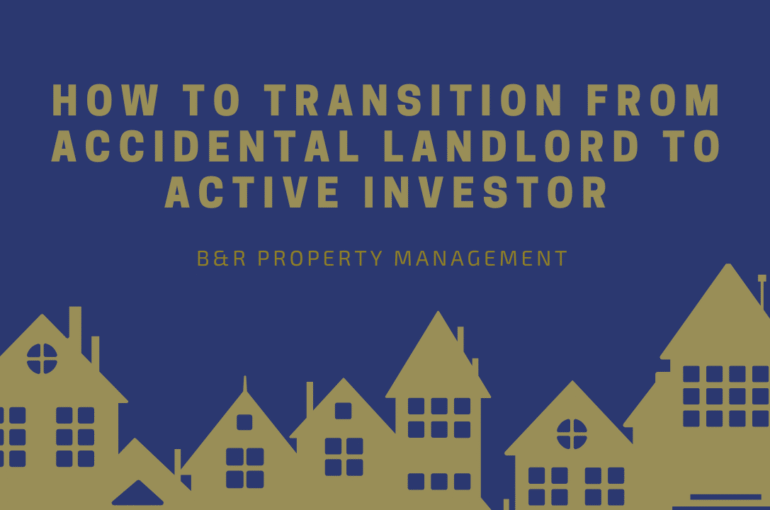How to Transition from Accidental Landlord to Active Investor
How to Transition from Accidental Landlord to Active Investor

Key Takeaways:
- Understand Your Finances – Track your property’s income and expenses to know its true profitability. Clear financial tracking is the foundation for smart investing decisions.
- Adopt an Investor Mindset – Move beyond simply collecting rent. Set long-term goals, leverage tax benefits like depreciation, and treat your property as a business that can grow your wealth.
- Leverage Experts and Market Insight – Build a trusted team of professionals (accountant, contractor, property manager) and stay aware about market trends to maximize returns and plan strategic growth.
- Treat Growth as a Long-Term Strategy – By reinvesting profits, improving your rental’s value, and using financing tools wisely, you can turn a single apartment into a foundation for long-term wealth and financial independence.
So, you never planned to be a landlord. Maybe you moved out of your apartment and decided to rent it. Or maybe you inherited one and thought renting was easier than selling. Whatever the case, that one decision brought you into the rental world — ready or not.
Now, you are thinking long-term and are wondering if this apartment can become more than an extra monthly check. Good news: it can. Partnering with a Property Management Company like B & R Property Management makes the shift from accidental landlord to active investor easy. It just takes some focus and a new way of thinking.
Start With Your Numbers
Let’s be honest, investing begins with math, not mindset. You need to know how your apartment performs before you plan anything else.
Begin with your net operating income (NOI). This is your total rent minus expenses like insurance, taxes, and maintenance. Knowing your numbers helps you see whether you are ahead of the curve or falling behind it.

If tracking all of this sounds like too much, that’s okay. Most first-time landlords are not used to breaking down expenses this way. That’s exactly why we offer property management services. Our reports show you where the money goes, what your returns look like, and where small changes can make a big difference.
Redefine Your Goals
When you first rented your place, your only goal might have been to cover your mortgage. But active investors think differently.
Ask yourself:
- Do I want steady cash flow or long-term appreciation?
- Am I open to buying more units?
- How hands-on do I want to be?
Your answers decide your next move. Active investors treat real estate as a long game. They look at equity growth, tax benefits, and opportunities to scale, not just monthly rent.
Understand How Depreciation Works
Depreciation is something every serious investor uses but few beginners really understand.
The Internal Revenue Service lets you deduct the value of your building over time, usually 27.5 years for residential property. It is a way to reduce your taxable income because your property is “wearing down,” even if it is gaining value.
Here is an example: If your apartment building is worth $275,000 (not counting the land), you could deduct $10,000 a year. That is money back in your pocket during tax season.
i
Many new landlords skip this step because it sounds complicated, but a real estate tax specialist can help you calculate your deduction properly and make sure you are following IRS rules.
Run It Like a Business
You might not think of your apartment as a business, but that is exactly what it is.
Every repair, every lease agreement, and every rent payment counts toward your financial picture. According to the National Association of Residential Property Managers, detailed documentation is one of the easiest ways to protect yourself from disputes and audit headaches.
That means saving every receipt, noting repair dates, and keeping signed lease copies. If this feels like a lot to juggle, you aren’t wrong, and you don’t have to do it all. Property Management Teams handle these systems daily so owners like you can focus on growing income instead of chasing paperwork.
Reinvest the Right Way
Once your apartment starts earning a steady income, the next move is to make that money work harder.
Start small. Target improvements that will attract desirable tenants and increase value – energy-saving and new flooring, or modern lighting. These are not just cosmetic. They assist in keeping your property competitive, that is, to rent better and have fewer vacancies.
After that, think bigger. Many investors use cash-out refinancing or a home equity line to buy their next property. That way, your first apartment helps fund the next one.

Be careful. Always check that new debt keeps your cash flow positive. A property advisor or manager can help you run those numbers before jumping in.
Build a Reliable Team
The more serious you get about investing, the more people you will need in your corner.
A good accountant. A responsive contractor. A reliable property manager. These relationships save time and protect your investment when things go wrong. You will also learn faster by surrounding yourself with people who already know the business.
Watch the Market, Not Just the Rent
Markets shift constantly. Rent, interest rates, and demand by tenants may vary within a matter of a couple of months. Even minor adjustments, like seasonal rent adjustments or enhancing the efficiency of your building, would cushion your bottom line. Keeping yourself active and updated keeps your apartment ahead of the curve.
Know When to Hand It Off
Managing apartments is work, and time is money. Filtering tenants, repair scheduling, and remaining within the housing laws are not easy. Most landlords conclude that professional management will provide better results.
Final Thoughts
You might have become a landlord by chance, but turning into an investor is a choice.
Once you know your numbers, take advantage of tax tools, and treat your apartment like a business, you will see how much potential you have been sitting on.
At BR Property Management, we help apartment owners turn accidental beginnings into planned investments. We take care of the work that slows you down so you can focus on the growth that matters.
Because real success in real estate starts when you stop managing and start investing — one apartment at a time.



